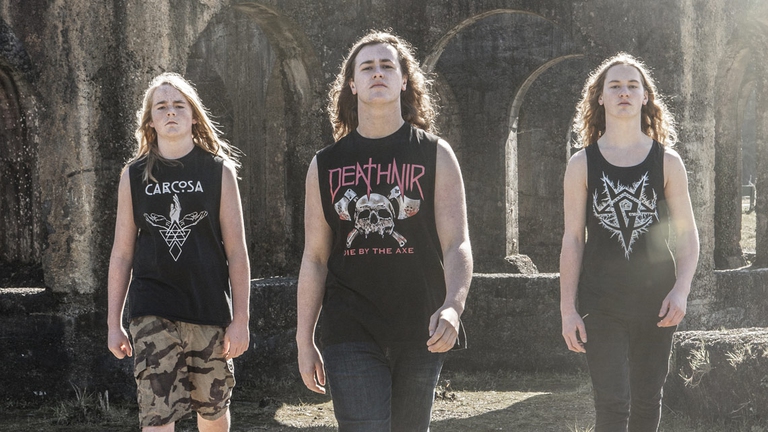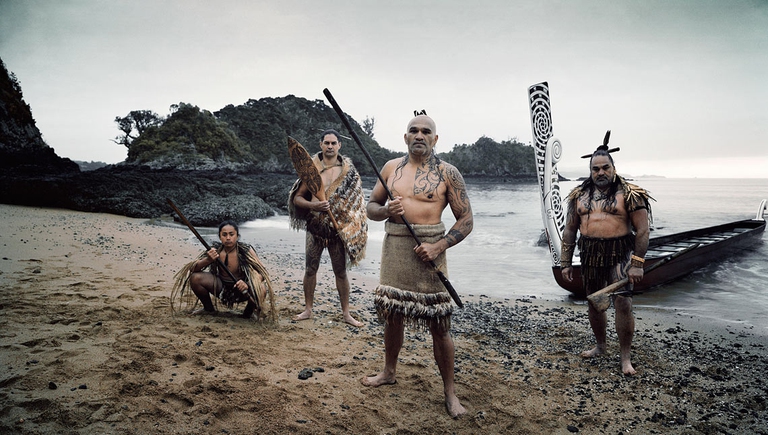
A special report from the Yuqui territory delves deep into the dreams, challenges, joys and sadness of one of Bolivia’s most vulnerable indigenous groups.
Three teenagers from New Zealand sing in the Maori language about abuse at the hands of British colonisers. Thanks to their thrash metal music, young people are being attracted to native culture.
Their name is Alien Weaponry, the same name given to the British colonial arsenal that attacked the natives of New Zealand. Three youngsters between the ages of 15 and 17 play thrash metal music and sing in the language of their Maori ancestors, te reo, to tell their story and keep a dying indigenous culture alive.
This combination of heavy metal instruments and Maori lyrics written by the young band from Auckland isn’t only unique, it works perfectly. Their epic imagery and message against oppression, abuse and the consequences of colonialism is attracting a growing crowd, even in Europe.
From a very young age, brothers Henry and Lewis de Jong embraced their father and now manager Neil’s musical taste: he contributed to their immersion in the work of metal bands like Metallica, Rage Against the Machine and Pantera. They were also deeply fascinated by the true stories of their ancestors from the Ngati Pikiao and Ngati Tuara tribes their dad told them. One of their ancestors was called Te Ahoho, a warrior who died in a bloody battle to defend his land from the British army.
Alien Weaponry was founded in 2010 by the de Jong brothers and their friend and bass player Ethan Trembath, a story told in the song called Ru Ana Te Whenua (The earth trembles). This track also includes elements from the haka dance, performed before battle or during ceremonies.
The band sings and screams about the seizure of their lands in the single titled Raupatu. New Zealand, inhabited by the Maori tribe, which is of Polynesian descent, was discovered by the Dutch sailor Able Tasman in 1642 and was shaken by the arrival of Europeans in the first half of the 19th century, when colonisation gave birth to the conflict between the Maori and British. The Waitangi treaty was signed in 1840, officially making New Zealand a British colony.
The violations were so severe that they caused the Maori to basically lose all their properties and rights. One of the colonial government’s laws, promulgated in 1863, enabled the seizure of land from anyone who was considered a rebel. Millions of hectares were unjustly taken from Maori owners, causing the community to sink into poverty, shifting the balance of power and changing the country’s history forever.
“A lot of kids I know at school and their parents don’t really know about whakapapa (Maori genealogy) or their history. So it’s really good to learn that from the old man,” Harry stated during an interview with radio RNZ. “Metal has the power and anger that allows you to express deep emotions,” Lewis explained in an interview with The Atlantic. “It helps us bring light to some unjust actions in the past. By singing in te reo we’re trying to make young people learn the language and pass it on to future generations”.
Alien Weaponry’s art gives more than just hope. The Maori language and culture almost disappeared due to the impact of colonisation, even though there was an attempt to revive then in the Eighties when theNew Zealand government promoted them giving birth to a few TV and radio shows. Nevertheless, according to recent census data, only 21 per cent of Maori – 15 per cent of the total population – speak their own language.
The problem of disappearing linguistic minorities isn’t affecting only this culture. According to the United Nations approximately half of the 6,000 languages spoken around the world are disappearing, one every two weeks.
Siamo anche su WhatsApp. Segui il canale ufficiale LifeGate per restare aggiornata, aggiornato sulle ultime notizie e sulle nostre attività.
![]()
Quest'opera è distribuita con Licenza Creative Commons Attribuzione - Non commerciale - Non opere derivate 4.0 Internazionale.
A special report from the Yuqui territory delves deep into the dreams, challenges, joys and sadness of one of Bolivia’s most vulnerable indigenous groups.
The Yuqui people of the Bolivian Amazon fight not only to survive in the face of settlers, logging and Covid-19, but to preserve their culture and identity.
Jair Bolsonaro is accused of crimes against humanity for persecuting indigenous Brazilians and destroying the Amazon. We speak to William Bourdon and Charly Salkazanov, the lawyers bringing the case before the ICC.
Activists hail the decision not to hold the 2023 World Anthropology Congress at a controversial Indian school for tribal children as originally planned.
Autumn Peltier is a water defender who began her fight for indigenous Canadians’ right to clean drinking water when she was only eight years old.
The pandemic threatens some of the world’s most endangered indigenous peoples, such as the Great Andamanese of the Andaman and Nicobar Islands in India.
The Upopoy National Ainu Museum has finally opened. With it the indigenous people of Hokkaido are gaining recognition but not access to fundamental rights.
A video shows the violent arrest of indigenous Chief Allan Adam, who was beaten by two Royal Canadian Mounted Police (RCMP) officers.








